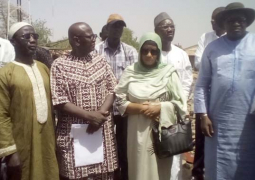Stakeholders in the energy sector are currently taking part in a two-day retreat at the Paradise Suites Hotel in Kololi to review the energy policy.
The synergy was organised by the Ministry of Energy, and is aimed at encouraging an open, participatory and holistic review and diagnosis of the energy sector.
It also seeks to adopt a roadmap for the sustainable development and management of the energy sector.
The two-day forum will discuss the energy sector strategy and work plan of the ministry, the current status of the electricity sector and come up with proposals to ensure its sustainability.
The retreat was officially opened by the Secretary General and the Head of the Civil Services Dr Njogu Bah.
He said the two-day retreat was meant to bring together key energy sector stakeholders to review and discuss the energy policies and strategies and adopt a roadmap for the sustainable development and management of the energy sector.
Poverty reduction remains the core issue of the
“The
He said access to modern energy services is necessary for productive activities and essential services. “While reliable energy services, by themselves, are not sufficient to eradicate extreme poverty, they are necessary for creating the conditions for economic growth and improving social equality,” he said.
The secretary general added that The Gambia government is committed to the provision of adequate, reliable, efficient and affordable energy to support the economic development of the country.
The recent development in the electricity sub-sector, namely the Rural Electricity Project and Western Region Electricity that is currently being implemented, and the operation of an Independent Power Producer (IPP), to name a few, are all testimony of the Gambia Government commitment.
Dr Bah stated .that in pursuit of its policy of having affordable electricity, the Gambia Government recently reduced electricity tariff to encourage industrial and overall socio-economic growth.
He stated that the Gambia Government has realised that the capital requirement for the provision of adequate, reliable and efficient modern energy services is huge and cannot shoulder it alone as such has opened it arms to encourage investment from the private sector.
“This government strategy has made a significant impact, especially to the electricity subsector,” he said. “The Gambia Government will continue to make attractive policies to attract more private investors.”
Dr Bah noted that the fluctuation of oil prices and the growing concern for environmental protection requires diversification of the country’s energy sources. “This, therefore, calls for more investment in renewable energy technologies,” he said.
Dr Bah further implored experts to review and come out with policy and strategy recommendation to maximally harness the country’s renewable energy potential.
He then challenged the participants to come up with a roadmap that will ensure the availability of adequate, reliable, and efficient energy supply to support socio-economic development of the country.
For his part, Hon. Mambury Njie, who is overseeing the Ministry of Energy, said the purpose of the retreat is to develop a roadmap that would serve as a blueprint for developing the Gambia Energy sector.
The energy sector has registered tremendous development over the years, he says, adding: “Notably, the creation of the ministry in September 2007, expansion and extension of electricity services in both Greater Banjul and the provinces.”
He also said: “Without adequate, reliable and affordable energy to support our socio-economic developments, there cannot be any meaningful development.
“My Ministry is committed to creating the enabling policies to attract the desired investment in the sector to provide the required energy services to support the achievement of the developmental objectives of the country.”



